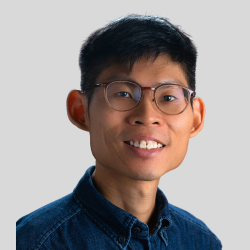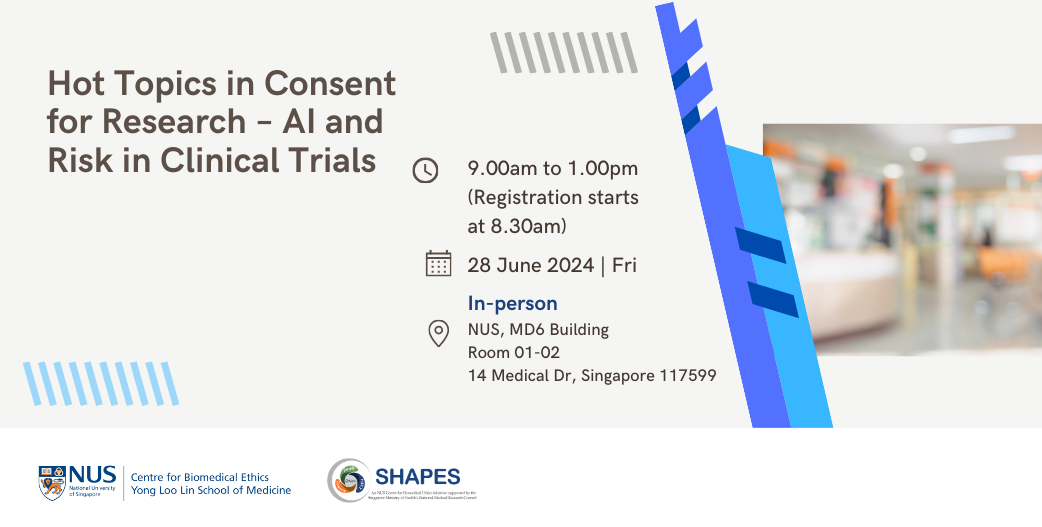Hot Topics in Consent for Research – AI and Risk in Clinical Trials
In light of the advent of generative AI and other recent technological advancements, this workshop aims to explore the ethical concerns surrounding two main topics: using artificial intelligence (AI) in the consent process, and the risks involved in clinicals trials.
In the first half of the workshop, we will consider the use of AI in acquiring consent. Technological advancements in AI including generative AI and large language models (LLM) such as ChatGPT have raised questions on how such technology can be utilized to assist medical research. These tools have the power to transform traditional consent forms into interactive chatbots that can answer questions from prospective participants, and AI could be used to generate consent forms tailored to the specific research project. We will explore the benefits, risks, and ethical concerns associated with the use of such tools, and particularly how they make acquiring consent more or less effective.
In the second half of the workshop, we will consider the ethical concerns in comparative effectiveness research (CER) and clinical trials generally. CER involves the direct comparison of healthcare interventions to determine which is the most effective. We will explore issues on how consent for such studies should be obtained, as well as the risk levels in CER. We will also discuss subjective risk in clinical trials in regards to patients’ and public’s perceptions and psychological aspects.
Who should attend
Clinician-scientists, IRB members/secretariat, those involved in the governance of research, academics, and policymakers
Programme
| Time | Topic | Speaker |
|---|---|---|
| 8.30 AM - 8.55 AM | Registration | |
| 8.55 AM - 9.00 AM | Welcome & Introduction | Dr Sumytra Menon |
| AI In Consent Forms | ||
| 9.00 AM - 9.30 AM | Large Language Models (LLMs) in Use of Consent Forms | Prof Julian Savulescu |
| 9.30 AM - 10.00 AM | Using GenAI in Drafting Consent Forms | Mr Joel Seah |
| 10.00 AM - 10.35 AM | Panel Discussion 1 |
Prof Julian Savulescu
Mr Joel Seah |
| 10.35 AM - 11.05AM | Tea Break | |
| Risk in Clinical Trials | ||
| 11.05 AM - 11.35 AM | Consent and Risk Communication in Clinical Trials | Dr Shou Yiyun |
| 11:35 AM -12.05 PM | Risk Levels in Comparative Effectiveness Trials | Prof Jerry Menikoff |
| 12.05 AM - 12.40 PM | Panel Discussion 2 |
Prof Jerry Menikoff
Dr Shou Yiyun |
| 12.40 PM - 12.50 PM | Feedback & Conclusion | |
Our Speakers

Professor Julian Savulescu
Professor Julian Savulescu FAHMS is the Chen Su Lan Centennial Professor in Medical Ethics at the National University of Singapore, where he directs the Centre for Biomedical Ethics. An award-winning ethicist and moral philosopher, he trained in neuroscience, medicine, and philosophy, going on to hold the Uehiro Chair in Practical Ethics at the University of Oxford from 2002, where he founded the Oxford Uehiro Centre for Practical Ethics in 2003, before moving to NUS in 2022.
He co-directs the Wellcome Centre for Ethics and Humanities. He is Distinguished Visiting Professorial Fellow at Murdoch Children’s Research Institute and Melbourne Law School, where he directs the Biomedical Ethics Research Group. Professor Savulescu was editor in chief of the Journal of Medical Ethics for a period of 12 years over two tenures, and founded the open access Journal of Practical Ethics.
He is a Fellow of the Australian Academy of Health and Medical Sciences and received an honorary doctorate from the University of Bucharest.

Mr Joel Seah
Joel is a PhD student at the Centre for Biomedical Ethics, NUS, and holds a BSc in Biology. A former Human Research Protection Programme (HRPP) professional for 7 years, he has held roles as an analyst and manager at the Institutional Review Boards (IRBs) of NHG, SMU, and NTU.
He is a member of the Consortium to Advance Effective Research Ethics Oversight (AEREO) which seeks to improve HRPP/IRB effectiveness, and on the advisory board for the Human Research Protections Clubhouse (hosted by SUNY Downstate) – a platform for networking & empowering HRPP/IRB professionals at all levels across the human research enterprise.
Joel’s current interests lie in AI and data ethics. His PhD thesis focuses on the role of Generative AI/Large Language Models (GenAI/LLMs) in the IRB’s functions and operations.

Professor Jerry Menikoff
Jerry Menikoff is Professor of Bioethics within the Centre for Biomedical Ethics and is also Senior Fellow of the Faculty of Law, NUS. He was trained as an attorney and physician. He has been involved with the ethics and regulation of research with human beings. After overseeing the program for protecting intramural research participants at the United States’ National Institutes of Health, he subsequently became the director of the Office for Human Research Protections.
During his 14 years in that role, he was a leader in the successful efforts to revise the U.S. regulations for protecting research participants. Many of the specific changes – including making consent forms public, eliminating duplicative reviews for multi-institutional research, and strengthening informed consent so that it better fulfilled its ethical underpinnings – were positions that he had long championed. Among his publications are the books Law and Bioethics: An Introduction (Georgetown University Press) and What the Doctor Didn’t Say: The Hidden Truth about Medical Research (Oxford University Press).

Dr Shou Yiyun
Dr Yiyun Shou is a Lead Scientist in the domain of Health and Lifestyle at the Lloyd’s Register Foundation Institute for the Public Understanding of Risk, and an Assistant Professor at the Saw Swee Hock School of Public Health at NUS. Dr Shou received a PhD in psychology from the Australia National University. Her research concerns understanding judgement and decision-making under risk and uncertainty. Her current research focuses on attitudes towards risk and uncertainty as well as risk communication in health and clinical settings.
Contact Persons
Dr Alexa Nord- Bronzyk (alexa.nb@nus.edu.sg)
Ms. Marissa Iskandar (medmi@nus.edu.sg)
Registration is by invitation only. For more information, you can email Dr Alexa Nord- Bronzyk (alexa.nb@nus.edu.sg)

